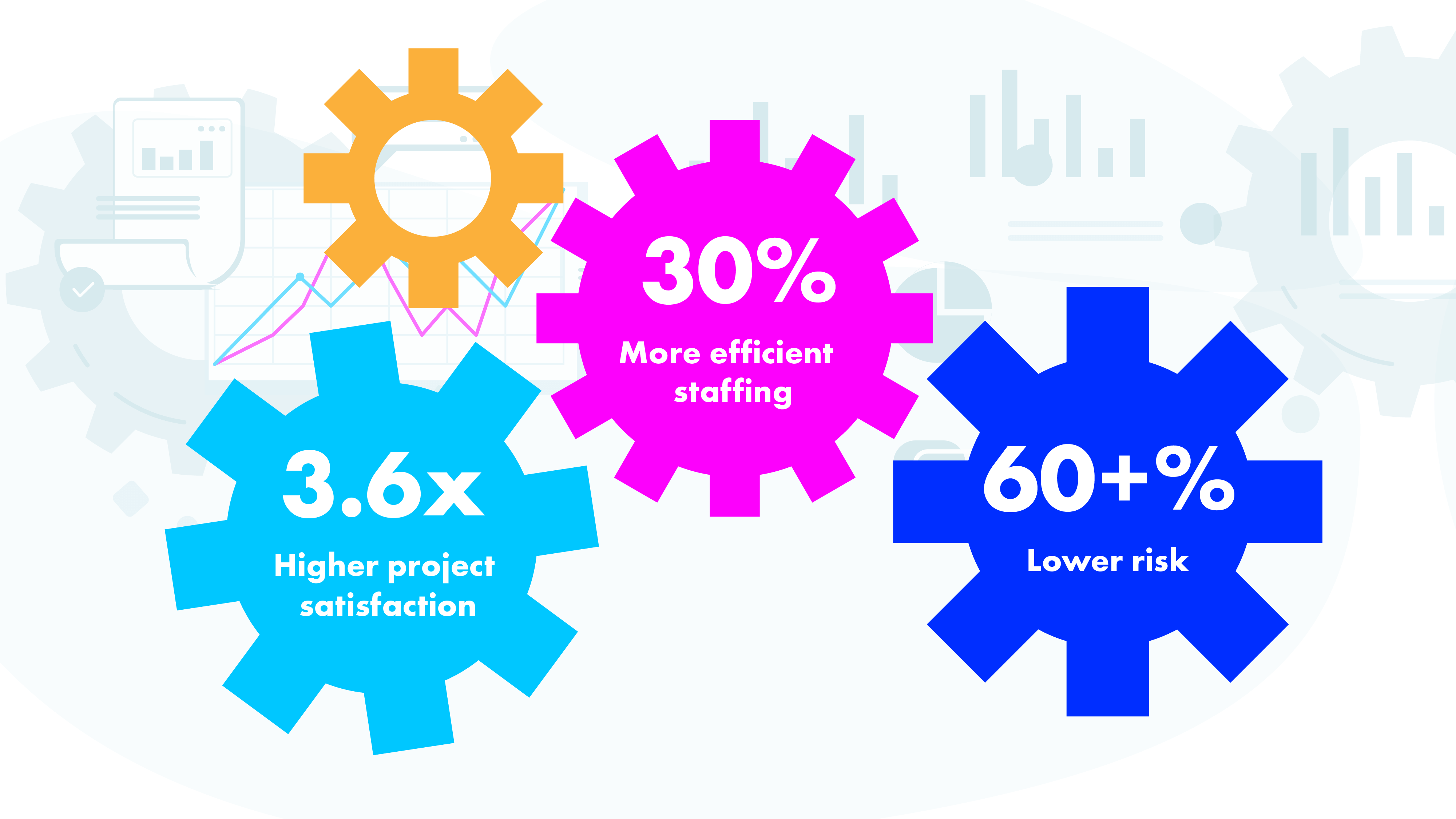
Digital transformation projects are challenging initiatives being launched across almost every industry sector. For IT leaders, the result of each initiative can either be a career maker…or a career breaker. Yet, according to McKinsey, more than 70% of digital transformation projects fail. A new study from Constellation Research sheds light on digital transformation best practices. After evaluating results from over 190 enterprise projects, Constellation Research found that three best practices can lift project success rates from under 30% to over 90%. The three keys to success are:
- Team intelligence: Continuously calibrate team effectiveness and morale – don’t wait for disaster to strike before adjusting team resources.
- Talent assessment: Good teams start with understanding the skillsets and cultural fit of every team member.
- Deliverable reviews: Use independent experts to review project deliverables to ensure quality and get early warning of communication challenges.
Constellation Research found that these three best practices can increase project success rates by 3x, improve employee retention by 2x, and increase team efficiency by over 30%.
Team Intelligence
The key to digital transformation success is the way project teams are put together and managed. To put a high performance team together, it’s important to understand more than individual skill profiles; it’s vital to know how those skills will blend in a collaborative environment.
At Gigster, we have found that trended sentiment surveys of team members are a highly accurate predictor of project failure. People are social animals, and collectively they have a good track record of sensing danger, even if they don’t know precisely what form that danger takes. For trended sentiment surveys to be useful, they need to be conducted every two weeks, so that any significant shifts in team morale or customer confidence can be dealt with quickly while it is still possible to recover.
Typically, these shifts are caused by changes in team dynamics (poor communication or collaboration between team members) or by a change in scope caused by the technical team realizing that a business objective is not achievable or significantly more difficult than originally estimated. Once an issue has been identified with a team, the next step is to react quickly by swapping or adding resources to bring the right skills to the team.
Ideally, teams can blend skills across long-term employees and on-demand contractors – this provides access to broad skill sets while optimizing fixed team costs.
Talent Assessment
Digital transformation projects generally require a greater breadth of skills than typical IT projects, especially AI/ML skills. They also require a high level of creativity and ability to work collaboratively which makes it necessary to select team members carefully.
Team staffing success starts with understanding skillsets across employees and contractors to put the right person in the right role at the right time. Teams should blend core team members who bring continuity with subject-matter experts who bring on-demand skills and extra capacity when needed.
Talent assessment should happen organically as part of the team retrospective process. After each sprint, metrics are automatically generated that validate the skills of each team member, providing a quantitative basis for rating individual performance. In addition, peer reviews enable calibration of each team member’s collaboration skills.
Deliverable Reviews
We all know that the way to deal with risk for major medical decisions and expensive jewelry purchases is to get a second opinion from an independent expert. For digital transformation projects, where you’re literally betting the company, independent expert opinions are even more essential.
More projects fail from communication gaps between the project owner and the technical team than from skills gaps on the technical side. These communication gaps between the business owner and the technical team often show up in the first three deliverables: project scope, detailed design, and project architecture. In early project phases, teams are notoriously overly optimistic Project managers in particular, often try to avoid unnecessary conflict during the honeymoon phase of the project.
But this is exactly when conflict can be most useful, by identifying differences between business expectations and realistic technical capabilities. Within a team, there are often no peers for an architect or key expert to work with, so there is limited ability to use another expert as a sounding board for an approach. This leads to blind spots in key project deliverables, either because the person did not have time to flesh out their ideas, or because they didn’t have a thoughtful peer to point out flaws in their approach.
Deliverable inspections and trended surveys should start with the project’s first sprint retrospective. Independent, trusted experts can be just as valuable in reducing risk for software projects as they are in other high-risk industries. Everybody knows that team diversity is important, but in the top roles, diversity is particularly important. Each individual has strengths and weaknesses – those weaknesses are magnified for technical experts and managers.
Bringing in an independent expert is an inexpensive way to complement project leaders and help them overcome blind spots both around technology and around team dynamics.
Summary
Constellation Research has published a study that shows how following three best practices can reduce project delivery risks by over 60% for digital transformation initiatives. Projects that start with effective team intelligence, accurate talent assessment and continuous deliverable reviews can consistently achieve success rates in excess of 90%.
